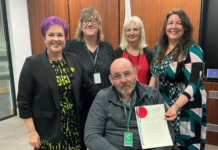Chancellor of the Exchequer Philip Hammond says “we must do everything we can to help British businesses stay globally competitive”
The Chancellor Philip Hammond today confirmed the vital role that British exports will play in ensuring that the UK remains globally competitive when we leave the European Union.
At a roundtable discussion on the new opportunities and issues affecting overseas trade, as part of his work engaging with business ahead of the Autumn Statement, the Chancellor hosted senior executives from some of Britain’s major exporters including Honda Motor Europe, GSK, Airbus Group UK, EEF the manufacturers’ organisation as well as British Exporters Association and Scotch Whisky Association at 11 Downing Street.
The Chancellor used the meeting to reiterate the fact that Britain is and always has been an open economy, with exports more than doubling over the last 17 years and explained that ensuring that British business retains the ability to trade easily with EU member states will remain a priority as part of Brexit negotiations.
But while the EU remains a major export destination, the discussions also focused on the growing importance of trade with non-EU countries. In 2015, the UK exported nearly £300 billion of goods and services to countries outside the EU, over half of total exports and equivalent to 15% of GDP. Since 2000, exports to China have increased by nearly 7 times and more than doubled for the US.
The UK’s most successful exports include financial services (3.5% of GDP in 2015) machinery (3.3% of GDP), vehicles (2.4% of GDP) and pharmaceuticals (1.3% of GDP).
The Chancellor of the Exchequer, Philip Hammond said:
Britain has always been a great trading nation. We must do everything we can to help British businesses stay globally competitive as we prepare to thrive outside the EU.
That means reminding the world that Britain is open for business and is committed to building strong trade and investment ties with key partners beyond the EU including China and the US.
UK exports are currently worth more than £500 billion a year. We export more goods and services to countries outside the EU now, than to those in the Union. It is vital we continue to build on this progress by strengthening our trade with markets around the world.
David Frost, Scotch Whisky Association, Chief Executive said:
Scotch Whisky’s £4 billion global exports make us Britain’s biggest single net goods exporter. Moreover, two-thirds of our exports are outside the EU, so, while Brexit brings challenges, there are also opportunities. Today I was able to emphasise the need for a pragmatic, non-disruptive transition to Brexit, and then for the government to negotiate new trading deals that give us even better opportunities than those we have now.
Paul Kahn, Airbus Group UK, President and CEO said:
International trade is vital for the continued success of the UK economy, and I’m encouraged that the Chancellor is giving British industry the opportunity to discuss our thoughts on how we trade in the future.
The decision to leave the EU has created a time of uncertainty but – more significantly – one of opportunity for UK industry. The UK aerospace, space and defence sectors generate over £65 billion of turnover every year, and for this to success to continue we need a government which supports international trade promotion and inward investment, whilst minimising red tape and barriers for exports.
Geoff de Mowbray, British Exporters Association, Co-Chairman said:
UK exports are facing a challenging, but exciting, period post Brexit. With a strong alignment between government, Industry and Banking we have every chance of success. The main challenge is creating a seamless way to purchase goods and services from the UK combining origination of opportunities, aggregation of the UK supply chain, and a finance solution which matches clients requirements.
Terry Scuoler, CEO of EEF, the manufacturers’ organisation said:
It’s vital that government and the business community work closely together as we face the challenges and opportunities presented by Brexit. Manufacturers want to be able to continue to access their biggest market in as smooth a way as possible after the UK leaves the EU. A high proportion of manufactures export, and they are keen to explore how they can expand further into both existing and new markets. This meeting with the Chancellor is therefore timely and welcome.
Sir Andrew Witty, GSK, Chief Executive Officer said:
As a major British employer and exporter we appreciate the opportunity to engage with the Chancellor today. As the government prepares for negotiations to leave the EU, we are fully committed to work with them to develop opportunities in the life science sector which will be part of any successful UK industrial strategy to deliver the boost in exports and productivity that is key to the country’s future economic success.
Today’s (12 September 2016) roundtable discussion is part of the Chancellor’s engagement with a variety of sectors including technology, clothing, food and manufacturing as well as meeting investors, importers and exporters and hosting representatives from the CBI, FSB and British Chambers of Commerce. The next meeting will take place on 19 September when the Chancellor will meet with major British firms to discuss productivity.
Meeting attendees:
- David Frost, CEO, Scotch Whisky Association
- Ian Howells, Senior Vice President, Honda Motor Europe
- Paul Kahn, President, Airbus Group UK
- Geoffrey de Mowbray, co-Chairman, British Exporters Association
- Terry Scuoler, CEO, EEF
- Sir Andrew Witty, CEO, GSK
Help keep news FREE for our readers
Supporting your local community newspaper/online news outlet is crucial now more than ever. If you believe in independent journalism, then consider making a valuable contribution by making a one-time or monthly donation. We operate in rural areas where providing unbiased news can be challenging. Read More About Supporting The West Wales Chronicle




















